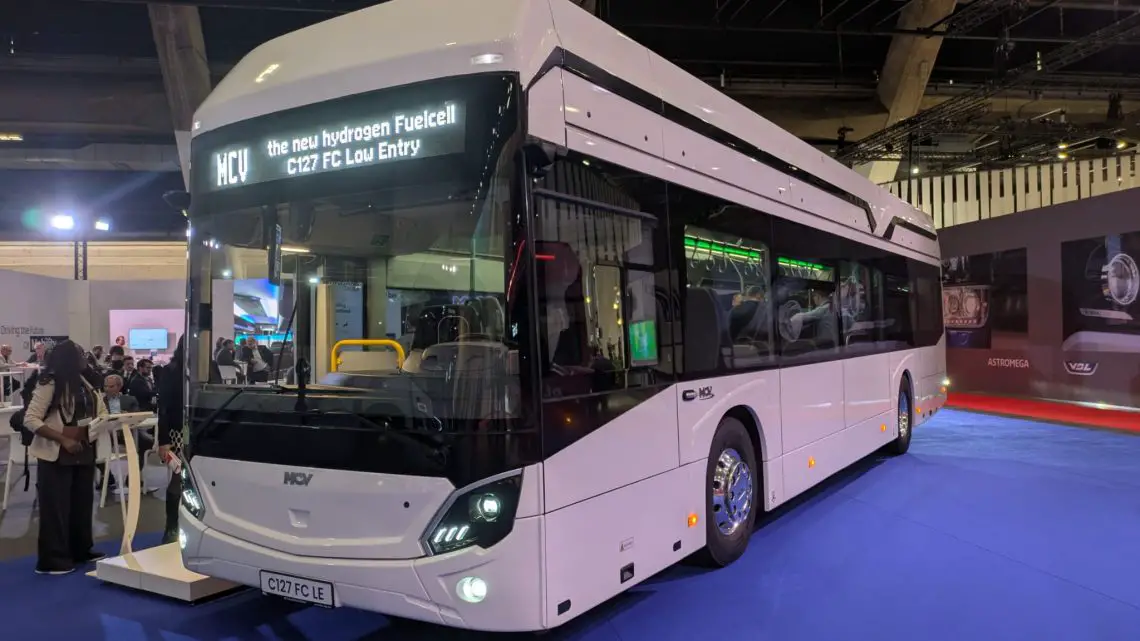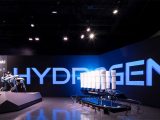
Hydrogen-Powered Bus: MCV Unveils C127 FC LE at Busworld Europe 2025
October 7, 2025It’s been an exciting week for sustainable transportation fans. At Busworld Europe 2025 in Brussels, MCV lifted the curtain on its brand-new C127 FC LE—a hydrogen-powered bus that teams a fuel cell bus system from Ballard Power Systems with a 100 kWh battery pack. This debut marks a bold step in MCV’s strategy to stake its claim as a global bus manufacturer powerhouse, all while driving urban transit toward zero emissions.
Busworld Europe 2025, the world’s largest bus and coach exhibition, draws thousands of industry pros each year, making it the perfect stage for MCV to showcase its latest sustainable transportation innovation.
A Fresh Take on Zero-Emission Mobility
The heart of the C127 FC LE is its hydrogen fuel cell, courtesy of Canada’s Ballard Power Systems. By combining hydrogen and oxygen in an electrochemical reaction, it generates electricity, leaving only water vapor and heat in its wake. That power then flows into an electric motor, delivering silky-smooth acceleration and whisper-quiet operation.
Backing up the fuel cell is a robust 100 kWh battery. This hybrid setup lets the bus capture energy during regenerative braking and store it for high-demand moments—think steep hills or quick getaways from stops. It also lightens the load on refueling stations by reducing hydrogen needs on shorter urban routes.
Underneath the sleek body is a sophisticated thermal management system that keeps both the fuel cell and batteries in their optimal temperature range, whether it’s a scorching Mediterranean summer or a chilly European winter. Built to meet top-tier safety and environmental standards, the C127 FC LE features a low-floor chassis for effortless boarding and an ergonomic cabin layout that prioritizes driver comfort and passenger accessibility.
Who’s Behind the C127 FC LE?
MCV is Egypt’s flagship bus builder, with production hubs in Egypt, Singapore, and South Africa. Under President Eng. Karim Ghabbour’s leadership, the company has doubled down on research and development, aiming to become a heavyweight in global bus manufacturing. “We’re thrilled to introduce the C127 FC LE. We believe it will set a new benchmark for sustainable transportation,” Ghabbour said at the unveiling.
Before tackling hydrogen, MCV found success with its electric sibling, the C127 EV, which recently secured its first order in Germany. That win laid the groundwork for this next leap in fuel cell technology.
Ballard Power Systems, based in Canada, has been pioneering fuel cell bus technology for decades. By supplying the propulsion core for the C127 FC LE, Ballard brings proven efficiency and durability, backed by years of experience in both stationary and mobile applications.
Can Hydrogen Fuel Cell Buses Transform Urban Transit?
Zero-emission buses aren’t a distant dream anymore. Hydrogen fuel cell models like the C127 FC LE tackle some of the challenges that battery-only vehicles face, especially around range and refueling. Here’s what they offer:
- Clean Air: Zero tailpipe emissions—no CO₂, NOₓ, or particulate matter.
- Fast Refueling: Hydrogen tanks can be topped up in roughly 15 minutes, similar to diesel.
- Long Range: Capable of covering 300 km or more on a single tank, depending on the route.
- Grid-Friendly: Smaller batteries mean less demand on charging infrastructure and the power grid.
- Driver Comfort: Quieter, smoother rides cut down on fatigue and boost safety.
Passengers appreciate the near-silent operation, which not only enhances the onboard experience but also reduces noise pollution at busy stops. For city planners and transit authorities, these benefits translate into lower lifecycle emissions, quieter streets, and a more resilient transport network that can adapt to fluctuating energy prices.
Building Momentum for a Hydrified Future
The rollout of the C127 FC LE comes as European emission regulations tighten and incentives for zero-emission fleets grow. By blending Ballard’s proven fuel cell bus tech with MCV’s manufacturing know-how, the company is positioning itself to win new orders in markets hungry for sustainable transportation solutions.
Of course, accessible hydrogen infrastructure will be the real litmus test. Transit operators need convenient refueling stations to make fuel cell buses viable at scale. The good news? Investments in hydrogen production and distribution are accelerating, driven by supportive policies and energy companies diversifying their portfolios. In many regions, government grants and incentives help shrink the initial investment gap, making hydrogen-powered buses an increasingly attractive option.
MCV’s global footprint means localized assembly and rapid after-sales support—crucial for fleet operators who demand minimal downtime. This network also spurs job creation in manufacturing and maintenance, amplifying the socio-economic benefits of adopting hydrogen buses.
The Bigger Picture for Urban Environments
Widespread adoption of hydrogen-powered buses like the C127 FC LE offers more than just CO₂ reduction. Lower NOₓ and particulate emissions can improve local air quality, cutting public health costs and enhancing general wellbeing. The quiet, low-vibration operation also makes city centers more pleasant for residents and visitors alike.
Looking ahead, hydrogen buses could even serve as mobile energy storage units, feeding excess power back into the grid during peak demand—a versatile tool in the clean energy arsenal.
Compared to traditional diesel models, hydrogen fuel cell buses have fewer moving parts in the drivetrain, potentially translating to lower maintenance needs and higher vehicle availability—exactly what fleet operators prioritize.
MCV isn’t banking everything on one solution. Alongside the fuel cell variant, the company offers fully electric buses like the C127 EV, showcasing its flexible approach to decarbonizing public transport. Whether operators choose plug-in or hydrogen-powered bus options, the mission remains the same: slash emissions, cut operating costs, and drive cities toward a greener future.
With climate targets climbing ever higher, innovations such as the C127 FC LE are exactly what the industry needs to stay ahead. If MCV’s latest bus delivers on its early promise, we could see fleets around the world shifting gears toward hydrogen at an unprecedented scale. In the race to zero emissions, this might just be the game changer.



 With over 15 years of reporting hydrogen news, we are your premier source for the latest updates and insights in hydrogen and renewable energy.
With over 15 years of reporting hydrogen news, we are your premier source for the latest updates and insights in hydrogen and renewable energy.